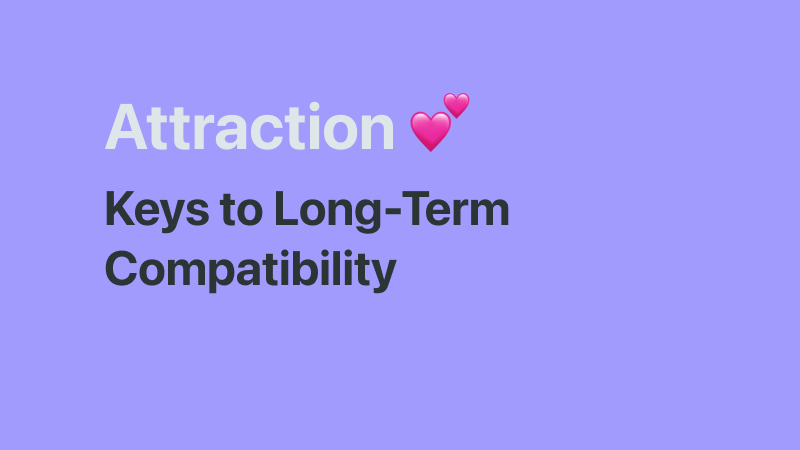What’s Behind Attraction?
Attraction—what makes it click, and more importantly, what keeps it going? You might feel sparks in the early days of a relationship, but what happens when the butterflies fade? Attraction is more than just a fleeting feeling; it’s built on a complex combination of factors that can set the foundation for long-term compatibility.
Whether it's chemistry, shared values, or just a feeling of comfort, understanding what drives attraction can help you build a relationship that lasts.
The Psychology of Attraction
Attraction is a fascinating blend of biology, psychology, and a sprinkle of mystery. Let’s break down some of the key elements:
-
Physical Chemistry
While looks aren’t everything, initial attraction often starts with physical chemistry. It’s that “wow” factor when you first meet someone. But it doesn’t stop there—long-term attraction depends more on emotional connection than physical appearance. -
Similar Values and Beliefs
Ever notice how couples who last tend to have similar life values? Shared beliefs about family, career, and lifestyle play a huge role in long-term compatibility. When you’re aligned on what’s important, you can avoid major conflicts down the road. -
Emotional Connection
Emotional attraction goes deeper than just liking how someone looks. It’s about feeling safe, supported, and understood by your partner. When you feel like your partner "gets" you, it strengthens the bond. -
Personality Compatibility
Are you both laid-back, or does one of you thrive on adventure while the other prefers staying in? Personality compatibility isn’t about being exactly the same, but it’s about complementing each other in a way that creates balance. -
Communication Style
How you communicate plays a huge role in long-term compatibility. If one of you loves deep conversations while the other avoids tough topics, that could lead to issues. Finding a way to meet in the middle ensures a smoother relationship.
Attraction vs. Compatibility
Attraction often gets the ball rolling, but compatibility is what keeps it going. You can feel wildly attracted to someone who, on paper, doesn’t seem like a great match. That’s why understanding long-term compatibility is key. Compatibility isn’t just about having things in common—it’s about how well you handle differences. Here are some key factors that influence long-term compatibility:
-
Flexibility
Relationships thrive when both partners are flexible and willing to adapt. Life is full of changes, and being able to grow and evolve together is essential. -
Conflict Resolution
Every couple argues—it’s how you handle those arguments that matters. Do you fight fair, or do things get heated and unresolved? Compatible couples know how to communicate their needs and resolve conflict in a healthy way. -
Shared Life Goals
It’s one thing to get along in the short term, but long-term compatibility often depends on having similar life goals. Whether it’s deciding on kids, careers, or where to live, being on the same page helps avoid friction later. -
Emotional Intelligence
Emotional intelligence (how well you understand and manage your emotions) plays a huge role in relationship success. Partners who can empathize with each other and manage their own emotional responses tend to have stronger, more resilient relationships. -
Physical Affection
While it might seem like just a "bonus," physical affection helps keep emotional intimacy alive. Whether it’s holding hands, hugging, or cuddling, small gestures of affection help reinforce connection.
How to Build Long-Term Compatibility
-
Get Curious About Your Partner
Ask deeper questions and get to know the "why" behind their thoughts and actions. The more you understand what makes them tick, the stronger your bond will be. -
Be Willing to Grow
Long-term compatibility isn’t about finding someone who fits perfectly into your life. It’s about growing and evolving together, embracing each other's differences, and learning from one another. -
Invest in Emotional Intimacy
Spend time together without distractions, engage in meaningful conversations, and prioritize emotional closeness. When your emotional connection is strong, you can weather challenges together. -
Practice Open Communication
Always be honest and clear about your feelings, even when it’s hard. Good communication is the cornerstone of any lasting relationship. -
Show Appreciation Regularly
A little gratitude goes a long way. Regularly appreciating your partner, both in words and actions, strengthens your bond and fosters long-term attraction.
Self-Reflection Question:
What qualities in my partner do I value the most, and how can I nurture those qualities to build long-term compatibility?
Quick Quiz:
-
What attracts you most in a partner?
a) Physical appearance
b) Emotional connection
c) Shared values -
How do you handle conflict in your relationship?
a) We avoid discussing tough topics
b) We argue but eventually resolve things
c) We have open, respectful communication -
Which is most important for long-term compatibility?
a) Flexibility
b) Physical chemistry
c) Shared life goals




